| Listing 1 - 10 of 42 | << page >> |
Sort by
|
Book
ISBN: 0889363773 9780889363779 Year: 1983 Publisher: Ottawa : Centre de recherches pour le développement international,
Abstract | Keywords | Export | Availability | Bookmark
 Loading...
Loading...Choose an application
- Reference Manager
- EndNote
- RefWorks (Direct export to RefWorks)
Periodical
Year: 1972 Publisher: Ottawa : International Development Research Centre,
Abstract | Keywords | Export | Availability | Bookmark
 Loading...
Loading...Choose an application
- Reference Manager
- EndNote
- RefWorks (Direct export to RefWorks)
Technical assistance, Canadian --- Rural development --- Developpement economique --- Pays en voie de developpement --- Developing Countries. --- Social Planning. --- International Cooperation. --- Developing countries --- Developing countries. --- Development assistance --- --Canada --- --Periodicals --- International cooperation
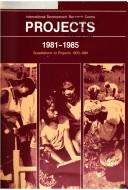
ISBN: 0889364672 9780889364677 Year: 1986 Publisher: Ottawa International Development Research Centre
Abstract | Keywords | Export | Availability | Bookmark
 Loading...
Loading...Choose an application
- Reference Manager
- EndNote
- RefWorks (Direct export to RefWorks)
Research --- Bibliography
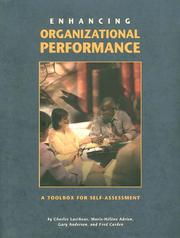
ISBN: 0889368708 1552500438 128071736X 9786610717361 9780889368705 9781552500439 9781846630361 1846630363 1846630363 9786610547555 1280547553 1846630371 Year: 1999 Publisher: Ottawa, Ont. International Development Research Centre
Abstract | Keywords | Export | Availability | Bookmark
 Loading...
Loading...Choose an application
- Reference Manager
- EndNote
- RefWorks (Direct export to RefWorks)
This guidebook presents an innovative and thoroughly tested model for organizational self-assessment. The tools and tips in Enhancing Organizational Performance go beyond measuring the impact of programs, products, and services. They integrate techniques of formative assessment, in which the assessment team becomes involved in helping its organization become more effective in meeting its goals. The tools and techniques are flexible, and the model can be adapted to any type or size of organization. Worksheets and hands-on exercises are included.
School management --- Organizational effectiveness --- Organizational behavior --- Organizational change. --- Change, Organizational --- Organization development --- Organizational development --- Organizational innovation --- Management --- Organization --- Manpower planning --- Behavior in organizations --- Psychology, Industrial --- Social psychology --- Evaluation. --- Organizational change --- #SBIB:002.IO --- #SBIB:35H202 --- Evaluation --- Overheidsmanagement: prestatiemanagement --- Managerial accounting.
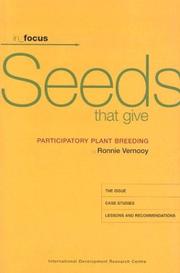
ISBN: 1552500144 9781552500149 1552501973 9781552501979 1280717998 9786610717996 Year: 2003 Publisher: Ottawa International Development Research Centre
Abstract | Keywords | Export | Availability | Bookmark
 Loading...
Loading...Choose an application
- Reference Manager
- EndNote
- RefWorks (Direct export to RefWorks)
A new approach to agricultural research and development is needed in order to conserve agricultural diversity, improve crops, and produce food of quality for all. This publication examines this new approach to agricultural research in light of 10 years of support by IDRC for projects promote agricultural biodiversity and participatory plant breeding. It examines key issues in detail, from the research questions, design of on-farm research to farmers' and plant breeders' rights. It argues for the development of new, supportive policies and legislation. A series of project stories illustrates
Plant breeding --- 574.9 --- 63.001.5 <1-773> --- 632.53 --- 574.9 Biogeography in general. Geographical distribution of organisms --- Biogeography in general. Geographical distribution of organisms --- 632.53 Parasitic plants. Epiphytes. Climbing plants --- Parasitic plants. Epiphytes. Climbing plants --- Crops --- Agriculture --- Breeding --- Agricultural research--Gebieden in ontwikkeling. Ontwikkelingslanden --- Plant breeding. --- Field crops --- Agrobiodiversity conservation. --- Conservation of agrobiodiversity --- Agricultural conservation --- Biodiversity conservation --- Breeding.

ISBN: 1281974188 9786611974183 1552503208 9781552503201 0889365385 9780889365384 Year: 1990 Publisher: Ottawa, Ont. International Development Research Centre
Abstract | Keywords | Export | Availability | Bookmark
 Loading...
Loading...Choose an application
- Reference Manager
- EndNote
- RefWorks (Direct export to RefWorks)
Women in development --- Sex role --- Technology --- Technology transfer --- Industries --- Gender role --- Sex (Psychology) --- Sex differences (Psychology) --- Social role --- Gender expression --- Sexism --- Applied science --- Arts, Useful --- Science, Applied --- Useful arts --- Science --- Industrial arts --- Material culture --- Social aspects --- Africa --- Economic policy. --- Social conditions. --- #SBIB:39A4 --- #SBIB:39A73 --- Toegepaste antropologie --- Etnografie: Afrika --- Gender roles --- Gendered role --- Gendered roles --- Role, Gender --- Role, Gendered --- Role, Sex --- Roles, Gender --- Roles, Gendered --- Roles, Sex --- Sex roles
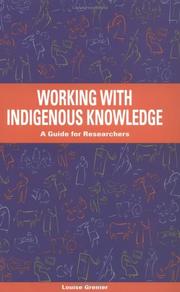
ISBN: 1280717351 9786610717354 1552500411 9781552500415 0889368473 9780889368477 Year: 1998 Publisher: Ottawa International Development Research Centre
Abstract | Keywords | Export | Availability | Bookmark
 Loading...
Loading...Choose an application
- Reference Manager
- EndNote
- RefWorks (Direct export to RefWorks)
Experience has shown us that development efforts that ignore local technologies, local systems of knowledge, and the local environment generally fail to achieve their desired objectives. Examples abound of western-lead teams of researchers failing to consult properly with indigenous populations, with the resulting "advancements" quickly proving to be unsustainable or, tragically, destructive. Thankfully, this trend is slowly changing. In the 1990's, indigenous knowledge has been fertile ground for research, and a wealth of information now exists on the topic.
Ethnoscience --- Technical assistance --- Sustainable development. --- Social ecology. --- Economic development --- Development, Sustainable --- Ecologically sustainable development --- Economic development, Sustainable --- Economic sustainability --- ESD (Ecologically sustainable development) --- Smart growth --- Sustainable development --- Sustainable economic development --- Indigenous knowledge systems --- Traditional knowledge systems (Ethnology) --- Ethnology --- Science --- Eco-development --- Ecodevelopment --- Ecology, Social --- Environment, Human --- Human ecology (Social sciences) --- Human environment --- Social sciences --- Anthropology --- Intercultural communication --- Research. --- Anthropological aspects. --- Environmental aspects. --- Environmental aspects --- #SBIB:39A2 --- Research --- Anthropological aspects --- Antropologie: methoden en technieken --- Indigenous peoples. --- Aboriginal peoples --- Aborigines --- Adivasis --- Indigenous populations --- Native peoples --- Native races
Book
ISBN: 8175968702 1281728128 9786611728120 1552504085 9788175968707 9781552504086 8175966017 9788175966017 9781552504086 Year: 2008 Publisher: New Delhi Foundation Books
Abstract | Keywords | Export | Availability | Bookmark
 Loading...
Loading...Choose an application
- Reference Manager
- EndNote
- RefWorks (Direct export to RefWorks)
Across China, university staff, researchers, students, and farmers are joining forces to bring to the fore action and field-based learning as a way to promote rural development studies. Learning from the Field: Innovating Chinas Higher Education System presents first-hand experience and lessons from an innovative, participatory curriculum development initiative in China. It includes the content of two novel courses, Community Based Natural Resource Management and Participatory Rural Development. The first versions of these courses were delivered at the College of Humanities and Development of the China Agricultural University in Beijing in the spring of 2005 and at the Jilin Agricultural University in Changchun in the spring of 2006.
Education, Higher --- Universities and colleges --- Rural development --- Natural resources --- Curriculum change --- Educational change --- Study and teaching --- Co-management --- Curriculum reform --- Instructional change --- Reform, Curriculum --- Curriculum planning --- Education --- National resources --- Resources, Natural --- Resource-based communities --- Resource curse --- Community development, Rural --- Development, Rural --- Integrated rural development --- Regional development --- Rehabilitation, Rural --- Rural community development --- Rural economic development --- Agriculture and state --- Community development --- Economic development --- Regional planning --- Curricula --- Economic aspects --- Citizen participation --- Social aspects
Book
ISBN: 817596863X 1552504727 8175967129 Year: 2010 Publisher: New Delhi : Foundation Books,
Abstract | Keywords | Export | Availability | Bookmark
 Loading...
Loading...Choose an application
- Reference Manager
- EndNote
- RefWorks (Direct export to RefWorks)
This book presents novel approaches to collaborative learning by drawing on research and practical experiences from China, South Asia, and Southeast Asia. The case studies show how local communities address and learn from challenges in managing natural resources through joint efforts with researchers and other actors. They demonstrate the merits of learning strategies that use a variety of methods. These methods are grounded in the local context that involves facilitators monitored from the outset. It creates a strong environment of collaboration and dynamic process management. The book shows that learning strategies that are both innovative and collaborative can lead to sounder rural development.
Natural resources --- Social learning --- Team learning approach in education --- Organizational learning --- Rural development projects --- Natural resources, Communal --- Communal natural resources --- Community-owned natural resources --- Collective settlements --- Commons --- Public lands --- Village communities --- Development projects, Rural --- Projects, Rural development --- Economic development projects --- Learning organizations --- Learning --- Communities of practice --- Knowledge management --- Learning teams --- Group work in education --- Socialization --- National resources --- Resources, Natural --- Resource-based communities --- Resource curse --- Co-management --- Citizen participation. --- Management --- Economic aspects
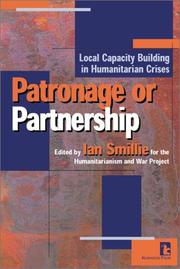
ISBN: 0889369445 1565491300 1565491297 9781565491298 1552502112 9780889369443 9781552502112 9786610744541 1280744545 Year: 2001 Publisher: Ottawa : International Development Research Centre,
Abstract | Keywords | Export | Availability | Bookmark
 Loading...
Loading...Choose an application
- Reference Manager
- EndNote
- RefWorks (Direct export to RefWorks)
Much has been written about the need to build local capacities in emergency and postemergency situations. Many relief programs, however, remain characterized by externality: in their funding, accountabilities, approach to management, and dependence upon expatriate staff. Reality often flies in the face of stated policy and good intentions. In reality, strengthening local capacity is easier said than done, and there are real tradeoffs between outsiders doing something right now in the midst of an emergency, on the one hand, and building longer term local skills, on the other.
Community organization --- Development aid. Development cooperation --- Developing countries --- Community development --- Disaster relief --- Humanitarian assistance --- #SBIB:327.4H74 --- Humanitarian aid --- International relief --- Disaster assistance --- Emergency assistance in disasters --- Emergency relief --- Emergency management --- Human services --- Citizen participation --- Ontwikkelingshulp en -samenwerking --- Crisis management --- Crises --- Management of crises --- Management --- Problem solving --- Conflict management --- Grants-in-aid, International --- International grants-in-aid --- Relief, International --- Relief (Aid) --- Charities --- Economic assistance --- Public welfare --- Consequence management (Emergency management) --- Disaster planning --- Disaster preparedness --- Disaster prevention --- Disasters --- Emergencies --- Emergency planning --- Emergency preparedness --- Public safety --- First responders --- Planning --- Preparedness --- Prevention
| Listing 1 - 10 of 42 | << page >> |
Sort by
|

 Search
Search Feedback
Feedback About UniCat
About UniCat  Help
Help News
News